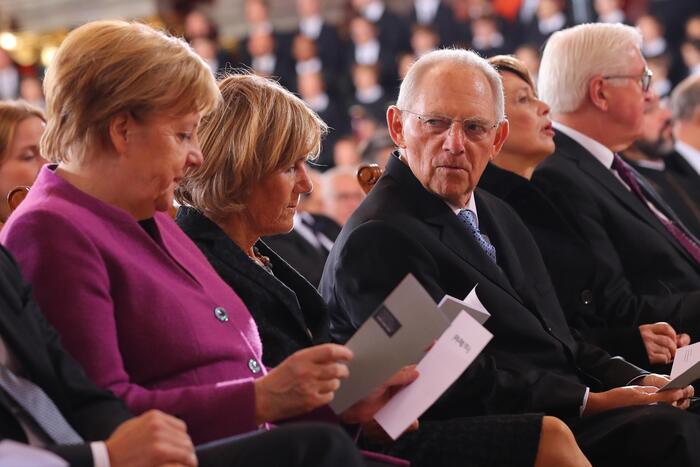Dear readers,
elected on Sunday, finally.
And with this election, the era of Chancellor Angela Merkel ends.
In the 16 years that she has ruled the fortunes of this country, she has been given various nicknames and attributions.
One of them: the climate chancellor.
And yes, Angela Merkel has promoted climate protection in Germany and around the world.
Much has changed since she took her oath of office in 2005 with an "So help me God": Greenhouse gas emissions are falling, phasing out coal power is a done deal and Germany is one of 189 countries that have ratified the Paris Climate Agreement .
And thus undertake legally binding to limit the increase in the global average temperature to well below 2 degrees Celsius compared to pre-industrial values, better still to a maximum of 1.5 degrees.
And yet: more would have been possible - and necessary -.
German greenhouse gas emissions are not falling fast enough.
During Merkel's government, as information from the Federal Network Agency shows, several hard coal or lignite power plants were freshly put into operation.
Many experts consider the coal phase-out decided on in 2038 to be far too late.
According to the IPCC, the global community may not even be a decade away from crossing the critical 1.5 degree threshold.
The argument that Germany cannot move anything on its own does not work.
The Federal Republic is the fourth largest economy in the world.
Germany has influence that it must make better use of in the future.
"Sufficiently much" did not happen
Angela Merkel herself also seems to be thinking about the climate protection record of her chancellorhood.
At her last federal press conference in July, she said: "I am of the opinion that I have put a lot of effort into protecting the climate." not enough happened «.
Of course, the world has changed in the past 16 years.
And knowledge about the state of the world climate, about the factors that determine it and change it at a breakneck pace, at the beginning of Angela Merkel's first term in office had by no means seeped into society to the extent that it is today.
Over the course of four legislative periods, acute crises have repeatedly occurred that have overshadowed the urgency of the climate crisis: in 2008, the investment bank Lehman Brothers filed for bankruptcy, in 2015 hundreds of thousands of people came to Germany who had to flee war and persecution, and in 2019 a virus developed discovered that was supposed to kill tens of thousands of people in Germany alone.
Civil society is running ahead
But in Merkel's fourth term in office something fundamental changed.
A then fifteen-year-old Swede
initiated
a worldwide protest movement for more climate protection
with her
Skolstrejk för Klimatet
.
And in the minutes in which I type these lines, tens or probably hundreds of thousands of people in Germany gather for a climate strike.
more on the subject
Climate Crisis: We Are Not Ready at AllAn essay by Jonas Schaible
It was in Merkel's last term in office that nine young people went to the Federal Constitutional Court.
And it was Merkel's government that was condemned by that same court in spring 2021 to a more efficient, better climate policy.
Large parts of civil society are ready to support climate protection measures.
This is what the economist Claudia Kemfert, who works at the German Institute for Economic Research in Berlin, thinks: “So far, politics has not really been active.
Not only in Germany, it is above all civil society that has understood.
And wants the changes, ”Kemfert told me on the phone.
Can the Chancellery become a driving force?
That is why the climate chancellor's farewell is an opportunity: that the Chancellery will become a place that provides impetus for climate protection instead of just implementing court rulings.
That someone will soon be at the helm of the federal government who has the courage to initiate the necessary cuts and restructuring in society.
With a government program that names and evaluates the climate crisis for what it is.
"It's about nothing more and nothing less than the future of our planet." These are the words of the outgoing climate chancellor.
If you like, we will inform you once a week about the most important things about the climate crisis - stories, research results and the latest developments on the biggest topic of our time. You can subscribe to the newsletter here.
The topics of the week
Promise at the UN General Assembly: Will the climate summit fail before it has started?
Greenhouse gas emissions are rising instead of falling, as became clear at the start of the UN General Assembly.
Countries like China, India or Russia rely on the Mikado tactic: whoever moves first, loses.
Eco-billionaire: "The German economy is one of the main causes of the global loss of nature"
The Swiss entrepreneur Hansjörg Wyss donates $ 500 million for nature conservation on the sidelines of the UN General Assembly.
What drives him and what he expects from a new federal government.
Fires in California: What's the point of wrapping sequoias in aluminum foil for fire protection?
Huge forest fires are blazing in California, and firefighters are wrapping giant trees in aluminum foil for protection.
Fire researcher Stephen Pyne explains why this has primarily a symbolic effect and what happens next.
Coal phase-out abroad: China is pushing the global energy transition - for self-interest
The People's Republic no longer wants to build new coal-fired power plants abroad.
There is much more to this than green image politics.
It's about dominance in a central future market.
»Climate Report« Podcast: Does Natural Gas Solve Our Coal Problem?
We are currently investing heavily in natural gas.
New power plants or pipelines like Nord Stream 2 cost billions.
Germany wants to be climate neutral soon.
Is it still worth investing in fossil fuels? That is what we ask ourselves in this episode, »Climate Report«.
Armin Laschet and the Union: Nuclear power is back - at least in the election campaign
Armin Laschet does it, as does Friedrich Merz - in the election campaign prominent Union politicians are again struggling with the exit from nuclear energy.
What's behind it?
Biodiversity: Foundations want to donate five billion dollars to biodiversity
With a five billion dollar donation, nine foundations want to help put a third of the earth's surface under nature protection by 2030.
Two dozen heads of state and government also pledged their support.
Report on the state of the seas: Too warm, too acidic, increasingly difficult to live in
The world's oceans and their inhabitants are doing badly, warn 150 experts.
You have observed the consequences of climate change for the oceans from space.
The changes also affect people.
Carbon dioxide emissions: record emissions from forest fires in the northern hemisphere
Since 2003, experts have been using satellite data to determine the extent of forest fires worldwide.
Accordingly, never before has so much carbon dioxide been released in the northern atmosphere as in July and August.
Pollutants in the air: the majority of EU countries exceed at least one limit value
Air pollution is considered to be the greatest environmental health hazard in the EU.
According to the latest data, limit values were exceeded in many countries in 2019, including Germany.
Stay Confident (and Go Vote!)
Your Viola Kiel









